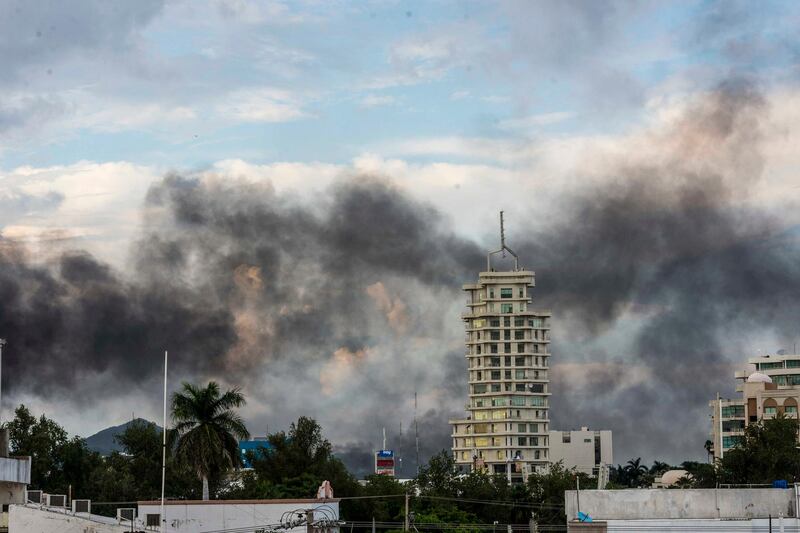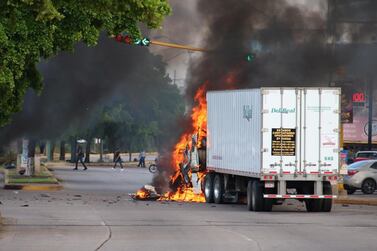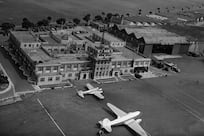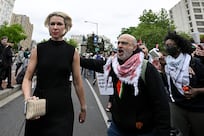The decision by Mexican President Andres Manuel Lopez Obrador’s security cabinet to release the captured son of the world’s most notorious drug lord has left him struggling to contain the damage amid public outrage.
Mr Lopez Obrador said the government took the decision after Mexican forces were overpowered on Thursday as they attempted to take in Ovidio Guzman Lopez, son of Joaquin "El Chapo" Guzman. The son is said to have taken over some criminal operations from his father. The confrontation, which left eight dead, occurred in Culiacan, the capital of the western state of Sinaloa.
His public security minister, Alfonso Durazo, admitted that the operation to capture Mr Guzman Lopez was a failure.
“The government clearly looks bad after this,” Daniel Kerner, an analyst at Eurasia Group, wrote in a research report. “It clearly failed to plan and anticipate the response that going after the son of one of the most notable drug leaders in Mexico would generate given the cartel’s influence in the city. As such, it looks like it had no strategy and no co-ordination.”
The incident presents the biggest security challenge yet to Mr Lopez Obrador, who was elected on promises to stop years of violence and has maintained an approval rating of more than 60 per cent in polls despite a stagnant economy. Homicides are on pace to break last year’s record, according to data until August, rising more than 3 per cent to pass 23,000.
Cartel members on Thursday turned Culiacan into a war zone after Mexican authorities surrounded Mr Guzman Lopez at a house where he was taking refuge. Homemade tanks complete with machine guns rumbled through the streets, stopping traffic and firing repeatedly. The city was littered with burning vehicles as residents posted videos on Twitter of gunfire and chaos. Plumes of black smoke rose over buildings.
“This decision was taken to protect citizens,” Mr Lopez Obrador said at his morning news conference Friday in the southern state of Oaxaca. “You can’t put out fire with fire. That’s the difference between our strategy and what previous governments have done. We don’t want deaths, we don’t want war.”
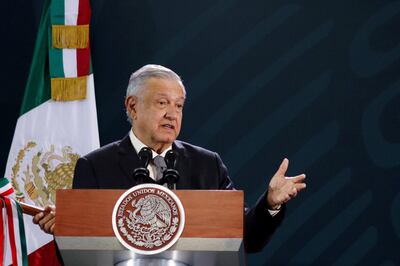
Responding to the violence in Culiacan by letting Mr Guzman Lopez go free sends a dangerous message to drug cartels that the Mexican government can be cowed by terrorist-like attacks against civilians, said Alejandro Schtulmann, who heads Mexico City-based political consultancy Empra. It is also embarrassing because the Sinaloa cartel’s firepower has been diminished in recent years and pales in comparison to that of other ascendant groups such as the Jalisco New Generation.
Now, other groups when facing an arrest may “resort to the same methods”, he said. “This may have opened the Pandora’s box in the context of fighting organised crime in Mexico.”
The case rips open an old wound for Mexico, where El Chapo twice escaped from prison before he was recaptured and finally extradited and convicted in the US. It comes in a week when more than a dozen police were killed in an ambush in the deadliest attack on law enforcement since Mr Lopez Obrador took office last December. At least 15 more people were killed in another shootout with the military in the nation’s south.
Mr Lopez Obrador said that the suspect had an arrest warrant and an extradition request. His father was sent to the US in early 2017 just as President Donald Trump was taking office.
The son's release was immediately decried across Mexican media, with one of the nation's largest newspapers, Reforma, running a headline saying "Little Chapo Subdues the Fourth Transformation", referring to the nickname that Lopez Obrador has given to his government.
Mexico has fought a decades-long war against drug gangs, in part because it serves as a connector between cocaine-producing nations in South America and consumers in the US.
Mr Lopez Obrador’s strategy focuses on deployment of tens of thousands of members from a new National Guard force to the most violent parts of the country, as well as education and subsidies for youth. But the phrase he has used to summarise his philosophy, “hugs, not shots”, has been criticised by political rivals and many security analysts as naive.
The release of Mr Guzman Lopez “sends a message of weakness to the blackmail of narcos”, said Veronica Ortiz, a lawyer and co-host on Mexico’s nonpartisan Congress channel. “It’s particularly serious for the military, because their own supreme commander is weakening them. For citizens, we’re left unprotected against criminals.”
